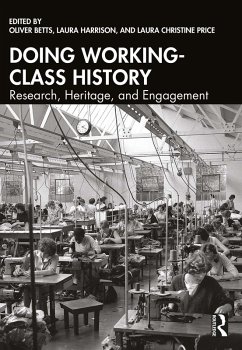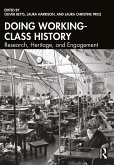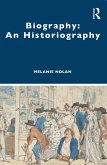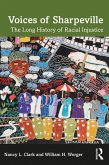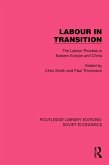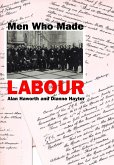Doing Working-Class History (eBook, PDF)
Research, Heritage, and Engagement
Redaktion: Betts, Oliver; Price, Laura Christine; Harrison, Laura
39,95 €
39,95 €
inkl. MwSt.
Sofort per Download lieferbar

20 °P sammeln
39,95 €
Als Download kaufen

39,95 €
inkl. MwSt.
Sofort per Download lieferbar

20 °P sammeln
Jetzt verschenken
Alle Infos zum eBook verschenken
39,95 €
inkl. MwSt.
Sofort per Download lieferbar
Alle Infos zum eBook verschenken

20 °P sammeln
Doing Working-Class History (eBook, PDF)
Research, Heritage, and Engagement
Redaktion: Betts, Oliver; Price, Laura Christine; Harrison, Laura
- Format: PDF
- Merkliste
- Auf die Merkliste
- Bewerten Bewerten
- Teilen
- Produkt teilen
- Produkterinnerung
- Produkterinnerung

Bitte loggen Sie sich zunächst in Ihr Kundenkonto ein oder registrieren Sie sich bei
bücher.de, um das eBook-Abo tolino select nutzen zu können.
Hier können Sie sich einloggen
Hier können Sie sich einloggen
Sie sind bereits eingeloggt. Klicken Sie auf 2. tolino select Abo, um fortzufahren.

Bitte loggen Sie sich zunächst in Ihr Kundenkonto ein oder registrieren Sie sich bei bücher.de, um das eBook-Abo tolino select nutzen zu können.
Economic and political uncertainty has brought the language of class-especially discussion of the working class-to a broad audience across scholarship and social debate. This introductory volume shows how the history of the working class has, is, and can be researched, written, and represented.
- Geräte: PC
- mit Kopierschutz
- eBook Hilfe
Andere Kunden interessierten sich auch für
![Doing Working-Class History (eBook, ePUB) Doing Working-Class History (eBook, ePUB)]() Doing Working-Class History (eBook, ePUB)39,95 €
Doing Working-Class History (eBook, ePUB)39,95 €![The Ideological Cold War (eBook, PDF) The Ideological Cold War (eBook, PDF)]() Johanna Rainio-NiemiThe Ideological Cold War (eBook, PDF)40,95 €
Johanna Rainio-NiemiThe Ideological Cold War (eBook, PDF)40,95 €![Propaganda and Power in the Age of Globalization (eBook, PDF) Propaganda and Power in the Age of Globalization (eBook, PDF)]() Simon SherrattPropaganda and Power in the Age of Globalization (eBook, PDF)42,95 €
Simon SherrattPropaganda and Power in the Age of Globalization (eBook, PDF)42,95 €![Biography: An Historiography (eBook, PDF) Biography: An Historiography (eBook, PDF)]() Melanie NolanBiography: An Historiography (eBook, PDF)37,95 €
Melanie NolanBiography: An Historiography (eBook, PDF)37,95 €![Voices of Sharpeville (eBook, PDF) Voices of Sharpeville (eBook, PDF)]() Nancy L. ClarkVoices of Sharpeville (eBook, PDF)42,95 €
Nancy L. ClarkVoices of Sharpeville (eBook, PDF)42,95 €![Labour in Transition (eBook, PDF) Labour in Transition (eBook, PDF)]() Labour in Transition (eBook, PDF)29,95 €
Labour in Transition (eBook, PDF)29,95 €![Men Who Made Labour (eBook, PDF) Men Who Made Labour (eBook, PDF)]() Alan HaworthMen Who Made Labour (eBook, PDF)52,95 €
Alan HaworthMen Who Made Labour (eBook, PDF)52,95 €-
-
-
Economic and political uncertainty has brought the language of class-especially discussion of the working class-to a broad audience across scholarship and social debate. This introductory volume shows how the history of the working class has, is, and can be researched, written, and represented.
Dieser Download kann aus rechtlichen Gründen nur mit Rechnungsadresse in A, B, BG, CY, CZ, D, DK, EW, E, FIN, F, GR, HR, H, IRL, I, LT, L, LR, M, NL, PL, P, R, S, SLO, SK ausgeliefert werden.
Produktdetails
- Produktdetails
- Verlag: Taylor & Francis eBooks
- Seitenzahl: 346
- Erscheinungstermin: 4. November 2024
- Englisch
- ISBN-13: 9781040183892
- Artikelnr.: 72336999
- Verlag: Taylor & Francis eBooks
- Seitenzahl: 346
- Erscheinungstermin: 4. November 2024
- Englisch
- ISBN-13: 9781040183892
- Artikelnr.: 72336999
- Herstellerkennzeichnung Die Herstellerinformationen sind derzeit nicht verfügbar.
Oliver Betts is Research Lead at the National Railway Museum in York. He specialises in the history of technology and class, exploring how working-class worlds across the Anglophone world were reshaped by technologies. He has published on workers, communities, and industry in history and museums. Laura Harrison is an Associate Professor of Modern History at the University of the West of England. She specialises in histories of youth and youth culture and is the author of Dangerous Amusements: Leisure, the Young Working Class, and Urban Space in Britain, c.1870-1939 (2022). Laura Christine Price is a historian, teacher, and writer. Her PhD thesis, completed at the University of York, explored wool textile workers' relationships to trade unionism. She is an independent researcher and teaches at a secondary school in West Yorkshire.
Introduction: A time for working-class histories Part 1: Working-class history in perspective 1. Disability in working class history 2. Parasites unite: Sensory history, the possibilities of transgression, and the perceptual manifesto of the proletariat 3. 'What are those ones with the hammers?': Teaching working class history in secondary schools 4. 'Everyone has a tale to tell': Family history, family historians and working-class histories 5. Museums and Heritage Sites as sources for working-class history 6. Reading against the grain: Non-Plebian Sources in working-class history 7. Accessible bibliography Part 2: Working-class history in context 8. The Daily Citizen: Class v consumerism in the early Labour press 9. Gender politics of class: Exploring the connections and collaboration between the Irish labour movement and the Irish Women's Franchise League in Dublin, 1908-1916 10. Bootstraps and bras: Maidenform, the International Ladies' Garment Workers Union, and the creation of a new export-led economy in Puerto Rico 11. Patriotism and the English working class, c. 1902-1929 12. Medical care for working-class children in the late eighteenth and early nineteenth century 13. 'I have told her that it was neglected, and asked her why': Working-class women and discourses of 'bad motherhood' in England and Wales, 1870-1939 14. Unorganised Workers: Wool textile workers and class identities in twentieth-century Yorkshire 15. 'Where the Brass Band is Beloved', Brass Bands and working-class cultural identity: Inventing a musical metonym in the Southern Pennines, c.1840-1914 16. Street life: The leisure spaces and places of working-class youth in Britain, c. 1870-1960 17. Coal miners in the industrialization and deindustrialization of France and Germany: A comparative synthesis of the Nord/Pas-de-Calais and the Ruhr Part 3: Working-class history in application 18. Representations of working-class lives at criminal justice heritage sites 19. How broadside ballads followed us into this century 20. 'We tell our own stories:' Bussing Out, a creative installation about working-class children in Bradford 21. 'The Past We Inherit, the Future We Build': The praxis of working-class history
Introduction: A time for working-class histories Part 1: Working-class history in perspective 1. Disability in working class history 2. Parasites unite: Sensory history, the possibilities of transgression, and the perceptual manifesto of the proletariat 3. 'What are those ones with the hammers?': Teaching working class history in secondary schools 4. 'Everyone has a tale to tell': Family history, family historians and working-class histories 5. Museums and Heritage Sites as sources for working-class history 6. Reading against the grain: Non-Plebian Sources in working-class history 7. Accessible bibliography Part 2: Working-class history in context 8. The Daily Citizen: Class v consumerism in the early Labour press 9. Gender politics of class: Exploring the connections and collaboration between the Irish labour movement and the Irish Women's Franchise League in Dublin, 1908-1916 10. Bootstraps and bras: Maidenform, the International Ladies' Garment Workers Union, and the creation of a new export-led economy in Puerto Rico 11. Patriotism and the English working class, c. 1902-1929 12. Medical care for working-class children in the late eighteenth and early nineteenth century 13. 'I have told her that it was neglected, and asked her why': Working-class women and discourses of 'bad motherhood' in England and Wales, 1870-1939 14. Unorganised Workers: Wool textile workers and class identities in twentieth-century Yorkshire 15. 'Where the Brass Band is Beloved', Brass Bands and working-class cultural identity: Inventing a musical metonym in the Southern Pennines, c.1840-1914 16. Street life: The leisure spaces and places of working-class youth in Britain, c. 1870-1960 17. Coal miners in the industrialization and deindustrialization of France and Germany: A comparative synthesis of the Nord/Pas-de-Calais and the Ruhr Part 3: Working-class history in application 18. Representations of working-class lives at criminal justice heritage sites 19. How broadside ballads followed us into this century 20. 'We tell our own stories:' Bussing Out, a creative installation about working-class children in Bradford 21. 'The Past We Inherit, the Future We Build': The praxis of working-class history
